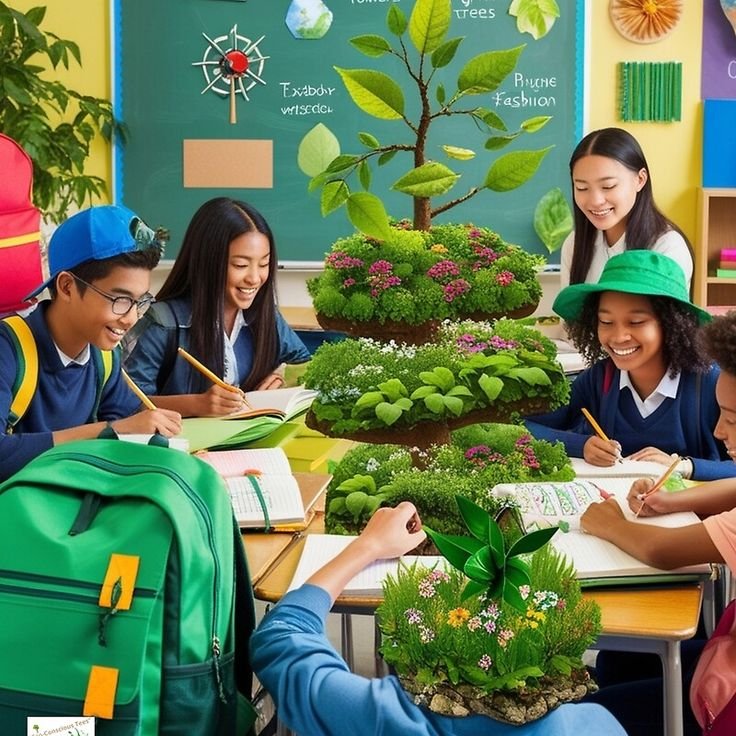1. Why Education is Key to a Better Future
Education is a powerful tool for equipping individuals with the knowledge and skills needed to make thoughtful and responsible choices that contribute to sustainability. Understanding the environmental, social, and economic impacts of actions empowers people to adopt behaviors that support the planet’s health. For instance, learning about the benefits of renewable energy or the problems caused by single-use plastics encourages more conscious decisions in daily life.
In this way, education lays the foundation for creating a world where mindful actions are the norm and sustainability is a priority.
Beyond fostering awareness, education drives innovation and problem-solving in the field of sustainability. It enables individuals to develop creative solutions, whether through designing energy-efficient technologies or reimagining urban spaces to be more environmentally friendly.
Moreover, education instills essential values such as empathy, equity, and a sense of responsibility, encouraging people to prioritize the greater good over short-term gains. These qualities make education an indispensable force for addressing the challenges facing our world, fostering a future where sustainability is not just an ideal but a global movement. Through education, we can create a culture of sustainability that spans generations.
2. Integrating Environmental Topics into Formal Education
Formal education systems play a crucial role in weaving environmental knowledge into everyday learning. Schools introduce young students to important concepts through subjects like science and geography, teaching them about renewable energy, water conservation, and waste management. These lessons help students understand the impact of their actions on the world, fostering habits that align with responsible living from an early age.
Higher education institutions push these efforts further with cutting-edge research and hands-on initiatives. Universities conduct groundbreaking studies on topics such as climate resilience and carbon capture, while also transforming campuses into models of eco-friendly practices. Programs for teacher training ensure educators have the tools to effectively share this knowledge with their students, creating a ripple effect that amplifies awareness and action across generations.
3. Community and Informal Education
Education outside the classroom is essential for reaching broader audiences and driving practical action. Local workshops and programs teach skills like composting, installing renewable energy systems, and gardening. These efforts empower individuals to make positive changes in their homes and communities while building a sense of collective responsibility. Nonprofit organizations and grassroots movements extend this impact by engaging people with campaigns and resources aimed at environmental preservation.
Digital platforms and social media have made knowledge more accessible than ever. Online courses offer topics ranging from renewable energy to resource conservation, enabling lifelong learning for people everywhere. At the same time, influencers and advocates on platforms like Instagram and TikTok share practical tips for reducing waste and conserving resources, connecting with audiences who might not engage with traditional forms of education. These informal channels are shaping a culture of responsibility and action.
4. Educating Future Generations
Engaging children and youth is critical for building a healthier planet. Interactive methods like storytelling, outdoor activities, and hands-on projects inspire a connection to nature and an understanding of how personal actions can make a difference. Eco-clubs and school programs give students opportunities to take on leadership roles while working on real-world projects, such as recycling campaigns or tree planting efforts.
Families also play an essential role in reinforcing these lessons at home. Simple activities like sorting recyclables or conserving water teach children the importance of thoughtful habits. Meanwhile, youth-led initiatives like Fridays for Future showcase how young voices can influence change on a global scale. Education equips these young leaders with the skills and knowledge they need to advocate effectively and contribute to a better tomorrow.
5. Challenges and Opportunities
Although education holds immense potential, it faces obstacles that must be addressed. Limited funding, resistance to curriculum changes, and unequal access to quality learning resources hinder the ability of schools to implement programs that teach environmental responsibility. These challenges are particularly pronounced in underserved communities, where barriers to education often compound existing inequities.
Nonetheless, there are promising solutions to these issues. Technology, such as virtual reality, offers innovative ways to engage learners by bringing abstract concepts to life. Partnerships between governments, businesses, and nonprofits can provide the resources needed to fund initiatives and expand access. On a global level, frameworks like UNESCO’s educational programs encourage collaboration between nations, allowing for the exchange of ideas and best practices. By addressing these barriers, education can become a driving force for a more balanced and thriving future.




